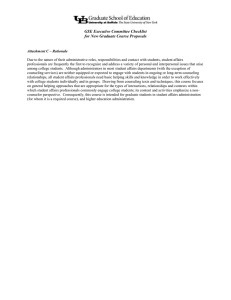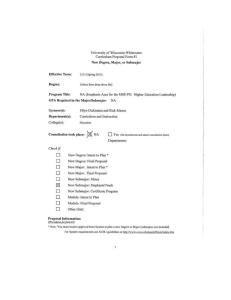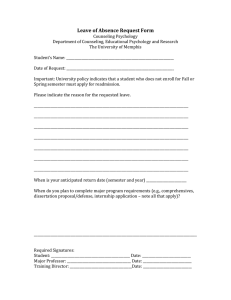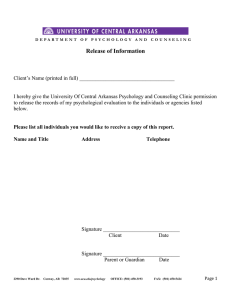Robert D. Brown
advertisement
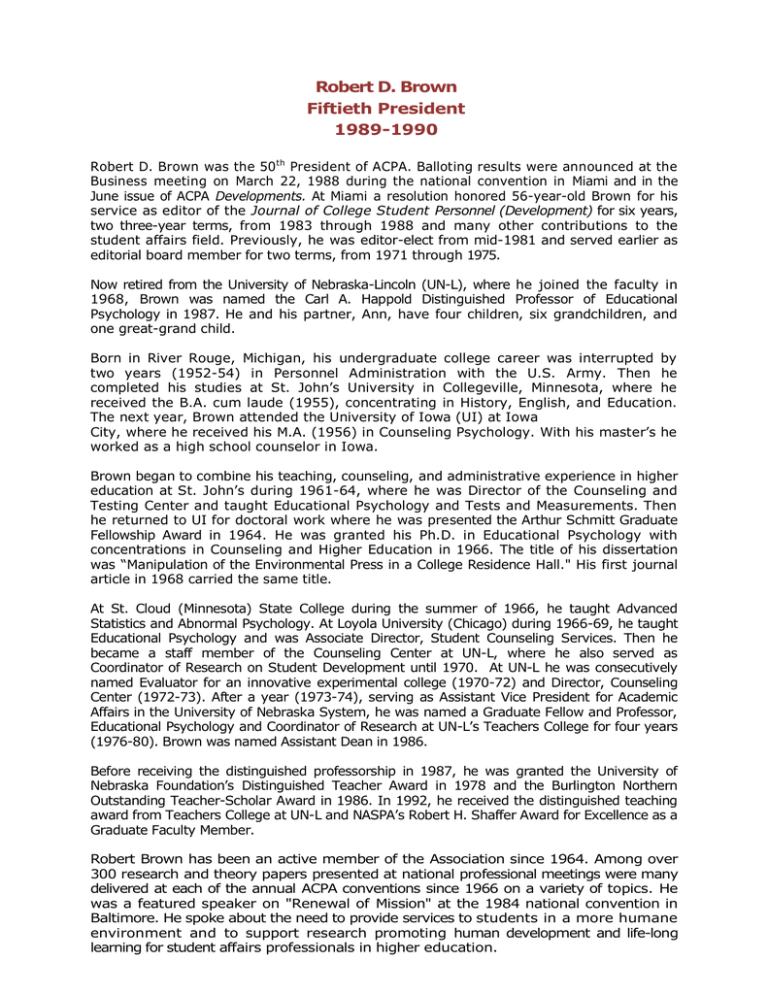
Robert D. Brown Fiftieth President 1989-1990 Robert D. Brown was the 50 th President of ACPA. Balloting results were announced at the Business meeting on March 22, 1988 during the national convention in Miami and in the June issue of ACPA Developments. At Miami a resolution honored 56-year-old Brown for his service as editor of the Journal of College Student Personnel (Development) for six years, two three-year terms, from 1983 through 1988 and many other contributions to the student affairs field. Previously, he was editor-elect from mid-1981 and served earlier as editorial board member for two terms, from 1971 through 1975. Now retired from the University of Nebraska-Lincoln (UN-L), where he joined the faculty in 1968, Brown was named the Carl A. Happold Distinguished Professor of Educational Psychology in 1987. He and his partner, Ann, have four children, six grandchildren, and one great-grand child. Born in River Rouge, Michigan, his undergraduate college career was interrupted by two years (1952-54) in Personnel Administration with the U.S. Army. Then he completed his studies at St. John’s University in Collegeville, Minnesota, where he received the B.A. cum laude (1955), concentrating in History, English, and Education. The next year, Brown attended the University of Iowa (UI) at Iowa City, where he received his M.A. (1956) in Counseling Psychology. With his master’s he worked as a high school counselor in Iowa. Brown began to combine his teaching, counseling, and administrative experience in higher education at St. John’s during 1961-64, where he was Director of the Counseling and Testing Center and taught Educational Psychology and Tests and Measurements. Then he returned to UI for doctoral work where he was presented the Arthur Schmitt Graduate Fellowship Award in 1964. He was granted his Ph.D. in Educational Psychology with concentrations in Counseling and Higher Education in 1966. The title of his dissertation was “Manipulation of the Environmental Press in a College Residence Hall." His first journal article in 1968 carried the same title. At St. Cloud (Minnesota) State College during the summer of 1966, he taught Advanced Statistics and Abnormal Psychology. At Loyola University (Chicago) during 1966-69, he taught Educational Psychology and was Associate Director, Student Counseling Services. Then he became a staff member of the Counseling Center at UN-L, where he also served as Coordinator of Research on Student Development until 1970. At UN-L he was consecutively named Evaluator for an innovative experimental college (1970-72) and Director, Counseling Center (1972-73). After a year (1973-74), serving as Assistant Vice President for Academic Affairs in the University of Nebraska System, he was named a Graduate Fellow and Professor, Educational Psychology and Coordinator of Research at UN-L’s Teachers College for four years (1976-80). Brown was named Assistant Dean in 1986. Before receiving the distinguished professorship in 1987, he was granted the University of Nebraska Foundation’s Distinguished Teacher Award in 1978 and the Burlington Northern Outstanding Teacher-Scholar Award in 1986. In 1992, he received the distinguished teaching award from Teachers College at UN-L and NASPA’s Robert H. Shaffer Award for Excellence as a Graduate Faculty Member. Robert Brown has been an active member of the Association since 1964. Among over 300 research and theory papers presented at national professional meetings were many delivered at each of the annual ACPA conventions since 1966 on a variety of topics. He was a featured speaker on "Renewal of Mission" at the 1984 national convention in Baltimore. He spoke about the need to provide services to students in a more humane environment and to support research promoting human development and life-long learning for student affairs professionals in higher education. Among his ACPA committee assignments, he was a member of the Tomorrow's Higher Education Task Force (Project) during most of the 1970s, serving on all three phases. He was commissioned to write a "white paper" published as a monograph: Student Development in Tomorrow's Higher Education: A Return to the Academy, made available at the 1972 convention in Chicago. The monograph is considered a cornerstone work for the student development movement, an effort to re-conceptualize the field, and guided the Association's moves through the 70s and 80s. During the 1990 national convention in St. Louis, several Senior Scholars presented a retrospective program to Brown's monograph in light of what they believed were the knowledge and values of student affairs in the 1990s. ACPA President Nancy Evans did the same in her presidential remarks in 2001. Beginning in 1977, Brown served for six years on the newly created Media Publications Board. As editor of the Journal, he recognized the Silver Anniversary of the Journal throughout Volume 25 (1984). At the opening session during the 1984 national convention in Baltimore, he was introduced as the current editor and honored along with past editors and editorial board members at a breakfast later during the convention. Robert Brown chaired the Awards, Memorials and Commendations Committee during 1985-86. During 1986-87, he served on the Journal Name Change Committee, which resulted in changing the name of the Journal from the Journal of College Student Personnel to the Journal of College Student Development. In Chicago during the joint ACPA/NASPA convention in 1987, he was appointed a representative to the Inter-Association Leadership Project. Late in 1988 and early in 1989, he worked with a committee to develop a refined written proposal for a project on Public Awareness of Student Affairs, and he chaired the Bylaws Committee. At the luncheon on Friday, March 31, 1989, during the national convention in Washington, DC, Robert Brown established priorities and major programs for 1989-90 in his presidential address entitled "Are the Dreams All That Impossible? A Visit from Don Quixote." Brown gave his speech dressed as Don Quixote with a makeshift helmet and spear. While president, he chaired the Executive Committee and presided at several Executive Council meetings and the annual Business meeting in St. Louis. His presidency was the first year of the revised Executive Council meeting schedule. After several drafts and several years, the Executive Council approved on July 9, 1989 the revised document entitled "A Statement of Ethical Principles and Standards of the American College Personnel Association." A copy of the ethics statement was sent to each member in the fall of that year, accompanied by a letter written by President Brown, in which he stated that ethical issues arise during the everyday practices of professionals. The 1990 national ACPA convention was held in St. Louis during April 1-4. Headquarters were the Adams Mark and the Marriott Hotels. The convention theme was "Creating an Ethical Climate on Campus," a major effort by Brown and the convention planning committee to stimulate members to think about the ethical implications of their work. At the end of his presidency, Brown appointed a committee to study the financial, legal, and organizational steps necessary for ACPA to disaffiliate from the American Association of Counseling and Development (AACD). Previous study committees took up only the question as to whether or not ACPA should disaffiliate from AACD; Brown’s charge to this committee went significantly beyond this question by assuming that disaffiliation would happen and asking the question, what would be the next steps. The committee’s report paved the path for ACPA’s separation from AACD in 1992. A prolific writer, Brown has written over 200 referred journal articles and 60 book chapters on college student life, housing, counseling, and program evaluation. Respected for the thoughtful perspective he contributes, the three most recent of his seven books published are in the areas of ethics and program evaluation: Applied Ethics for the Profession (1985, with H. J. Canon), Performance Appraisal as a Tool for Staff Development (1988) and Applied Ethics for Program Evaluation (1996, with D. Newman). Among the honors and awards bestowed on Brown for his contributions to the Association, he was one of the first three Senior Professionals selected to attend the Annuit Coeptis dinner at the Bonaventure Hotel in Los Angeles during the national convention in 1979. At the annual luncheon he was presented the ACPA Outstanding Contribution to Knowledge Award for his scholarly work in the profession. He was among the first group of Senior Scholars selected for recognition at Baltimore in 1984. At the national convention in Boston the next year, he was one of four Senior Scholars who held a lively discussion with keynote speaker Zelda Gamson following her general session address. In the fall of 1985, he contributed to a paper that addressed critical issues in higher education and the Association's response that was included in all the registration packets of conventioneers who attended the 1986 annual meeting in New Orleans. Brown has been honored as a Fellow in two divisions of the American Psychological Association: Division 17, Counseling Psychology and Division 44, Society for the Study of Gay and Lesbian Studies and also as a Fellow in the American Educational Research Association. His convention papers have won awards at the American Evaluation Association, as well as AERA. Brown has blended his research and program evaluation expertise in applied settings other than student affairs, such as numerous consultations with schools, public and private colleges, state departments of education, and legislative research divisions. His focus has been on designing and evaluating innovative instructional programs. When asked in 1990 to comment on the future of student affairs, Brown said he didn’t believe in trying to predict the future, but rather in trying to envision and make a reality what the ideal college would be like. He saw student affairs professionals as educators who attempt to make a reality of the rhetoric that college presidents espouse, when they say they seek to help students become better human beings. He also saw student affairs serving as the ethical conscience of the campus. Since retirement Brown continues to mentor doctoral students, publish his research, and write about student development. He has been intensely involved in promoting campus efforts to improve the quality of life on campus for GLBT students. In 2002, he garnered special recognition from the Academic Senate of UN-L for his efforts. And, in 2004, he received the UN-L Chancellor’s Award for Outstanding Contribution to the Campus GLBT Community for his campus climate study of GLBT student life, which was published in the Journal and is considered the most comprehensive such study ever conducted. He continues to try to win first place in his age group in long distance running events, while trying to keep up with his partner, Ann, who has biked across the United States, as well as in every state in the U.S. Today, Brown is studying strategies to encourage faculty to use instructional methods that promote student development. He is enthusiastic about the continuing excellent research being conducted on student development and hopeful that, whether incrementally or through an educational revolution, higher education will fulfill its promise to educate the whole student, and all students. His mantra for student affairs staff members is that they see themselves as educators and rather than predict the future, they shape it. He would like to see more outcome and qualitative research efforts that evaluate innovative programs and strategies in the classroom and out of the classroom that promote student development and learning, as opposed to the plethora of survey and correlational research that continues to predominately take up space in the journals. He cites the example of research using survey methodology to study alcohol use about college students or descriptive studies of ethnic students. Brown acknowledges that such studies can be helpful, but asks where is the research that seeks to actively promote student development and learning through creative and innovative (experimental, if you will) programs. He strongly asserts that even the most sophisticated statistical analyses (e.g., regression analysis, multivariate analysis, etc) are no substitute for examining the outcomes of a programmatic innovation in the residence halls, in the classrooms, in student activities, or in other aspects of student life. Progress in medicine comes about through experiments and assessing the effectiveness of new treatments; the same holds true for student development and learning. Brown says he owes his professional success to several key individuals. Included are Professor William Cofell and Father Arno Gustin, O.S.B. who as President of St. John’s University encouraged him to study for his doctorate and also helped find financial support for Brown going back to UI to live in married student housing with five children. ACPA played a prominent role in shaping Brown’s thinking and career. Don Hoyt, a past ACPA President served as his mentor at UI, as well as Albert Hood. Harry Canon, a prominent ACPA member hired Brown at UNL and gave full support to Brown’s work, as did Russell Brown and G. Robert Ross, another past ACPA President. Cynthia Johnson and Peggy Barr (also past ACPA Presidents), and Donna McKinley, Ursula Delworth, and Phil Tripp were strong supporters who helped Brown shape his ideas and gave him the confidence to share his ideas with others. He is proud to have had these special folks as colleagues, mentors, and friends. Finally, Brown looks forward to the day when the Association changes its name and the entire student affairs profession becomes one powerful force in higher education. But he admits he is not holding his breath.
